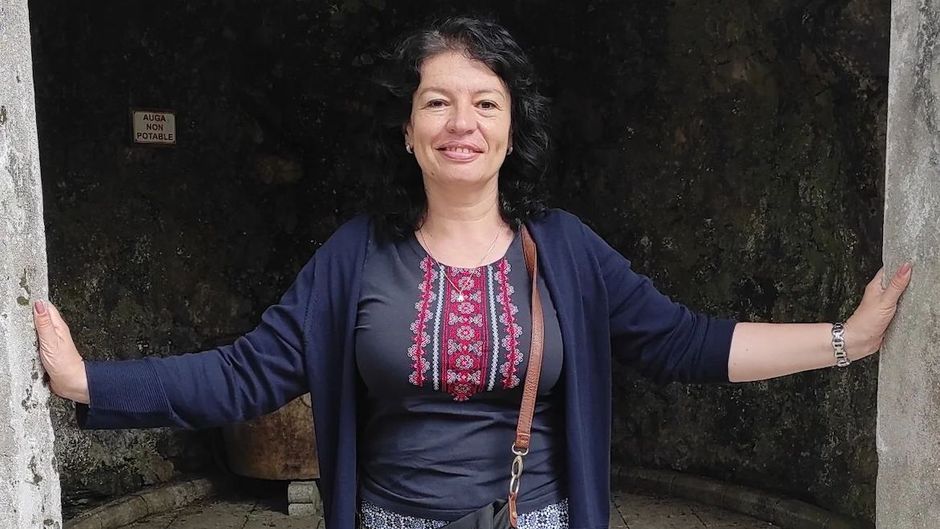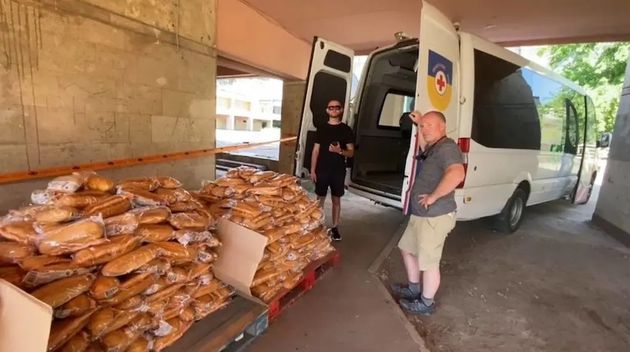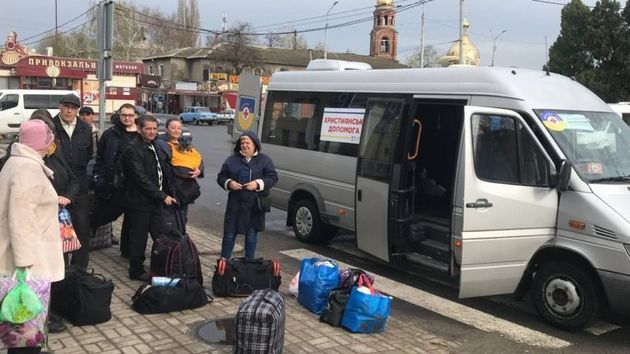“God is glorified even in the midst of Ukraine’s darkest hours”
Ukrainian missionary Mariana Laskava talks about her experience of leaving Kiev and continue serving refugees. “Every opportunity is used to preach the gospel”.
Protestante Digital · PONTEVEDRA · 21 JULY 2022 · 13:15 CET

Mariana Laskava is Ukrainian. She serves as a missionary with Word of Life, a mission with a Bible institute based near Kyiv.
She had to flee quickly, with a small suitcase, because of the threat of bombings that were about to begin in the country's capital.
After a few months serving among Ukrainian refugees, Mariana has been able to travel to Spain, where she will also participate in camps this summer.
In September she hopes to return to Kyiv, to serve in the Bible school where she accompanies students as they grow in their faith journey and also works as a translator for several English and Spanish-speaking teachers.
Spanish news website Protestante Digital has talked to her about how she is experiencing this conflict , and the current situation of her country.
Question. What kind of work do you do, and how was the day-to-day life at the Bible college before the war?
Answer.. I am a full-time missionary in Word of Life Ukraine, a mission that works with young people focusing on evangelism, but we also have a Bible institute.
Every year, in September, a group of 30-50 young people come from different countries, both from Ukraine and nearby countries, to study the Bible and live in the institute for one or two years.
We guide them in their studies, helping them to learn how to develop their ministries, encouraging them in evangelism - we do a lot of street evangelism in the streets of Kyiv - and helping them to grow in their Christian life, both through training and through the example they may have from us.
We spend time with our students and build a deep relationship with them.
Q. Do you mainly work with young people?
A. The students usually enter the Bible institute after finishing high school, before they start university, so they are usually between 17 and 19 years old.
In two years they are trained in the Bible and Christian life in the centre we have there, so that they can then develop their future work or mission.
Q. All this work was halted in February with the Russian invasion. How did you experience that?
A. In December, when Russia started to build up troops on the border, the TV news already talked about the possible invasion.
We, as a mission, were praying that it would not happen. But two weeks before the war started, we asked the students to leave. We moved up the holiday they used to have in March to the beginning of February, as the situation was getting tense.
The leadership of the mission in the United States asked us to have our bags packed in case we had to evacuate.
The day before the invasion they called us to urgently leave, that we had 40 minutes to prepare for the emergency evacuation.
Many people in the team didn't expect it to happen. I thought it could happen, because of the build-up of soldiers at the border.

Q. How did you flee?
A. It was all very traumatic, what we experienced that day and what many experienced in the following days.
We left quickly because we were warned that the shelling of Kyiv would start that night, but we could only take one small suitcase.
It's difficult, because you can't pack your life in a suitcase, and you leave your house in danger of being bombed. You also leave your family there, people you love, who don't leave the country, but trusting that they are in the Lord's hands.
It was a shock, something that tested our trust very much. It was traumatic.
Q. You are now in Spain, but what was your journey during these months?
A. I am now in Spain and many people care for me and look after me. But when the war started we went to Hungary, to the property that the mission has there.
Then, a week later, part of the team went to Romania, where the mission began to receive refugees arriving from Ukraine.
In two months we received about a hundred people that we were helping and serving.
Q. What are your plans for the future, do you think you will be able to return to Ukraine?
A. Most of our missionaries have already returned to Ukraine. The men stayed and during these months they were doing so much service, distributing food and helping, even risking their lives.
The women and children left, and some are still in other parts of Europe. I am planning to go to a camp in the Czech Republic in August, and then maybe go back to Ukraine to continue the work in the mission.
Q. Do you currently have family in Ukraine?
A. Yes, my mother and my brother and his wife did not want to leave. They were at risk in Kyiv, but God took care of them, I prayed very much for them and we are still in constant communication.
Q. When you face such an unexpected and complicated situation, what do you learn about God and your relationship with Him?
A. When you go into a storm like war, if you have a close relationship with God, you go through the storm holding on to something stable.
The emotions, the trauma that you go through can be very damaging, but if you hold on to God, the true Strong Tower, you can know the Lord even more.
I work in personal counselling, and now my understanding of how to help those who suffer is greater. Since I have experienced so much suffering, I can now understand that situation better.
God is opening doors, when you have a good relationship with Him, you come out stronger, but if the relationship is not good, the situation can lead to you being crushed.

Q. Have new opportunities for ministry been opened?
A. In this storm, we have been able to bring the gospel to many people. In places where they have been left without homes, without resources, 90% of the volunteers working in Ukraine are Christians.
A great witness is being given. We as a mission help by bringing goods, food, clothes, water, bread, evacuating people... And every opportunity has been used to preach the gospel.
We are involved in something big, because in this time around 5,000 people have heard the gospel through our missionaries.
Q. How do you think the country is coping with such a burden? How do people react among those who do not yet know God?
A. As far as I understand from those who are working in the churches giving food and aid, the churches are filling up with people who don't know Christ.
One church in Kiev that I know well is holding the meetings outside the church building, because inside there is room for about 80 people and there are services where they have over 300 people attending. They are doing activities for children, for women.
I have seen churches celebrating baptisms. So God is glorified even in the midst of the darkest hours of our country.
Q. Why is it important to have God in your life in a crisis like this?
A. Life flows from God and in His presence there is fullness of joy.
If one wants to live through a trial with the strength and joy of the Lord, one must trust in Him, because even in allowing this trial, He is working in our hearts, supplying the needs, teaching us and putting us where we need to be.
When you trust in God you can see all this, but if you don't have God, you can only see the bad things. If one is close to God, one can see God's work in the midst of great difficulty.
Q. As time goes by, we seem to lose sensitivity to Ukraine. How can we help you and your country?
A. There are several ways. It is very important to pray. Our soldiers testify that God is guarding their lives. You need to pray for the war to finish, for the bombs not to fall where the people are, and that God will preserve our country.
You can pray that the gospel will continue to be spread and that many will become children of God.
You can also help with finances, through different entities.
And the third way would be, when the war is over, to set up working teams to help in the reconstruction of houses and infrastructures.
Published in: Evangelical Focus - europe - “God is glorified even in the midst of Ukraine’s darkest hours”
